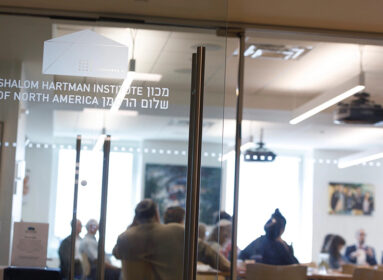
Hebrew Health care installed a new slate of officers at the agency’s recent annual meeting. They include (left to right): David Houle, executive vice president and CFO; Bonnie Gauthier, president and CEO; E. Merritt McDonough, Jr., vice chairperson; Richard Rubenstein, chairman of the Board of Trustees; Ross Hollander, first vice chairperson; Anja and Gene Rosenberg, honorary life chairpersons; Gary Schwartz, immediate past chairman; Pia Rosenberg Toro, auxiliary co-president; and Deborah Kleinman, vice chairperson. Not pictured: Brad Hutensky, vice chairperson and Joshua Hollander, vice chairperson/secretary.
WEST HARTFORD – In 1901, a group of women in Hartford started collecting nickels to help the elderly indigent of the city. More than a century later, what evolved into Hebrew Health Care (HHC) has become a nationally recognized comprehensive geriatric healthcare provider. This month, HHC marks its 110th anniversary.
“The Handkerchief Brigade,” as those early fund-raisers were dubbed, would go door to door until they had enough money to build the first Hebrew Home on Wooster Street in Hartford. The institution would relocate twice – to Washington Street and Tower Avenue – before moving to its current location on Abrahms Boulevard in West Hartford in 1989.
In 1972, with the construction of a connector from Mount Sinai Hospital to the Tower Avenue facility, Hebrew Home obtained a chronic disease hospital license, allowing the institution to offer on-site rehabilitation and pharmacy services.
Two years later, Hebrew Home opened its first adult day center, the second such facility to be licensed in Connecticut. The program eventually became the foundation of the Hebrew Home’s community-services affiliate, the Community Outreach Program for the Elderly (COPE). Now known as Hebrew Community Services, the program includes two adult day centers, licensed home-health and assisted-living services agencies, hospice care, meals, and respite programs.
When Hebrew Home and Hospital moved to Abrahms Boulevard, its services included skilled nursing, a chronic-disease hospital, sub-acute rehabilitation, a special skilled-nursing dementia-care unit, and a protective-care unit for patients with psychiatric diagnoses in need of skilled-nursing services.
The new facility allowed Hebrew Home and Hospital to expand its community-based services, adding outpatient medical and rehabilitation clinics, wellness programs, home-delivered meals, and personal emergency-response services.
In early 2001, the Hebrew Home and Hospital opened Hoffman SummerWood Community, an assisted-living campus not far from the Abrahms Boulevard facility.
In 2003, Hebrew Home and Hospital restructured its corporate presence by establishing Hebrew Health Care, a parent organization for its service affiliates. In 2005, Hebrew Health Care broadened the scope of services offered at its 45-bed geriatric hospital, to accommodate those older adults whose needs are often not well understood in a large community hospital setting.
Today, the Hospital at Hebrew Health Care is comprised of a 22-bed behavioral-health unit and a 23-bed medical unit. Hebrew Health Care created a hospice agency in 2009.
At its annual meeting earlier this month, HHC installed new board members. Among them is incoming board chairman Richard Rubenstein of West Hartford, a 35-year veteran of the board. He follows in the footsteps of his father, Charles, who served as the eleventh chair of the Hebrew Home when it was located on Tower Avenue.
“I am thrilled to be associated with Hebrew Health Care,” says Rubenstein, who has served as lay leader with several non-profit organizations in greater Hartford. He is former president of Congregation Beth Israel and the Jewish Federation of Greater Hartford.
Rubenstein can pinpoint the moment in 1966 when he committed himself to helping the Jewish community. Then a sophomore at the University of Pennsylvania, he was one of eight college students selected by the American Jewish Joint Distribution Committee (JDC) to learn first-hand about Jewish life in Europe.
Not only did he meet his future wife, Lea, on the trip, but a visit to the Mauthausen concentration camp in Austria was a turning point, learning the fate of inmates forced to carry 100-lb. granite blocks up the infamous “Stairs of Death” from the on-site rock quarry.
“The Jews were made to run up and down the steps and if you didn’t go fast enough, the guards would push you to your death,” he says. “I came away from the trip changing from not interested in things Jewish to feeling that I had to do something to help the Jewish people.” Rubenstein calls his involvement in Jewish organizations “payback.”
“I’ve been very lucky in business and life and the JDC was my marriage broker,” he says. The Rubensteins have been large contributors to the Jewish Federation and other local and national Jewish causes, and have made more than 20 trips to Israel, most of them missions.
The continued success of Hebrew Health Care is dependent on the institution’s ability to adapt to the rapidly evolving model of medical care in the U.S., Rubenstein says.
“We have to change our models to meet state and federal government regulations, and the needs of our clients.”
To help determine HHC’s course, Rubenstein and fellow board members Elliott Tertes and Gideon Rutenberg have been working on a strategic plan over the last 18 months.
“We have a lot on the drawing board,” Rubenstein says. “Our agenda is to put the institution on a firm financial footing and keep it there. We plan to expand those services that are really beneficial to the community and look at new services that we need to get into. A lot of our focus will be on cooperation with other institutions and healthcare providers. This effort will be led by our 35 trustees, people from all walks of life and with a wide variety of experience, who are really willing and able to give the necessary guidance to move us forward.”
HHC’s 110th anniversary is a true milestone, Rubenstein says. “It’s a celebration that the community has an institution that offers wonderful, comprehensive, and professional services for the elderly, and does so in a caring way.”








 Southern New England Jewish Ledger
Southern New England Jewish Ledger














